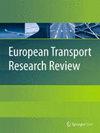同步交通重新规划:基于代理的模拟方法
IF 4.2
3区 工程技术
Q1 TRANSPORTATION
引用次数: 0
摘要
在快速发展的全球市场中,物流业面临着诸多挑战,需要实施更具弹性的解决方案,以应对未来的任何干扰。同步多式联运被视为多式联运的延伸,是解决这一问题的关键,因为它提供了更加灵活和可持续的货运方式,同时还注重不同物流参与者之间的合作。我们将同步多式联运视为一个代理集合,这些代理不仅具有各自的特征和行为,而且还相互影响,从而影响整个系统。在本文中,我们采用基于代理的建模方法来研究该系统。该网络代表了长途运输和拖运的结合,其中预运和终运仅由卡车完成,其余部分可由卡车、火车或驳船完成。我们进行了一项数值实验,以评估在不同物流服务提供商的关系和重新安排运输路线的情况下节省成本和减少排放的情况。我们的研究结果表明,与 "一切照旧 "方案相比,"同步模式 "方案更具经济效益和环境效益,灵活性和可靠性也更高。此外,我们的模型还验证了当物流服务供应商相互协作时,成本节约的幅度相当大。敏感性分析的结果表明,在比较不同方案时,总体趋势是一致的。因此,从原始实验中得出的结论似乎不仅适用于该具体实例,而且具有更广泛的相关性和适用性。本文章由计算机程序翻译,如有差异,请以英文原文为准。
Synchromodal transport re-planning: an agent-based simulation approach
In the rapidly evolving global marketplace, the logistics sector faces a multitude of challenges that demand implementation of more resilient solutions to respond to any future disturbance. Synchromodal transport, which is viewed as an extension of multimodal transport, is known as a key answer to this issue, as it provides more flexible and sustainable freight transport and also focuses on collaboration between different logistics players. We consider synchromodal transport as a collection of agents that not only have their own characteristics and behaviors, but also interact with each other, which impacts the entire system. In this paper, we study the system using an Agent-Based Modeling approach. The network represents the combination of long-haul and drayage transport, where pre-haulage and end-haulage are done only by truck, and the rest can be done by trucks, trains, or barges. A numerical experiment is conducted to evaluate cost savings and emissions reduction under different logistics service providers’ relation and re-routing scenarios. Our findings show that synchromodal scenarios are more economically and environmentally efficient, and that they lead to higher flexibility and reliability compared to business-as-usual scenarios. Additionally, our model verifies that the cost saving is considerable when logistics service providers collaborate with each other. The results of sensitivity analyses show consistent overall trends when comparing the different scenarios. Therefore, the conclusions drawn from the original experiment appear to be applicable, not only for that specific instance, but have broader relevance and applicability.
求助全文
通过发布文献求助,成功后即可免费获取论文全文。
去求助
来源期刊

European Transport Research Review
Engineering-Mechanical Engineering
CiteScore
8.60
自引率
4.70%
发文量
49
审稿时长
13 weeks
期刊介绍:
European Transport Research Review (ETRR) is a peer-reviewed open access journal publishing original high-quality scholarly research and developments in areas related to transportation science, technologies, policy and practice. Established in 2008 by the European Conference of Transport Research Institutes (ECTRI), the Journal provides researchers and practitioners around the world with an authoritative forum for the dissemination and critical discussion of new ideas and methodologies that originate in, or are of special interest to, the European transport research community. The journal is unique in its field, as it covers all modes of transport and addresses both the engineering and the social science perspective, offering a truly multidisciplinary platform for researchers, practitioners, engineers and policymakers. ETRR is aimed at a readership including researchers, practitioners in the design and operation of transportation systems, and policymakers at the international, national, regional and local levels.
 求助内容:
求助内容: 应助结果提醒方式:
应助结果提醒方式:


